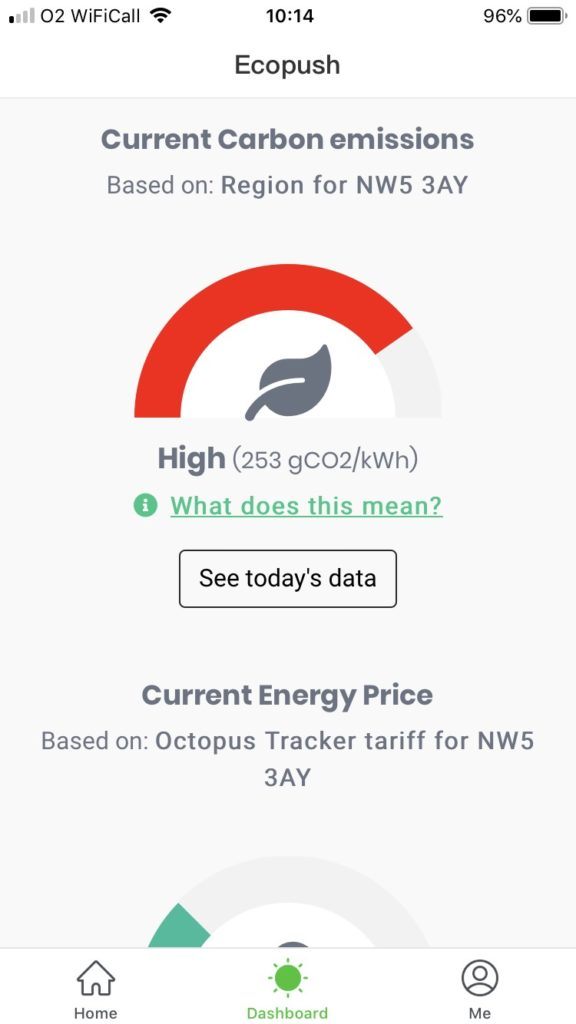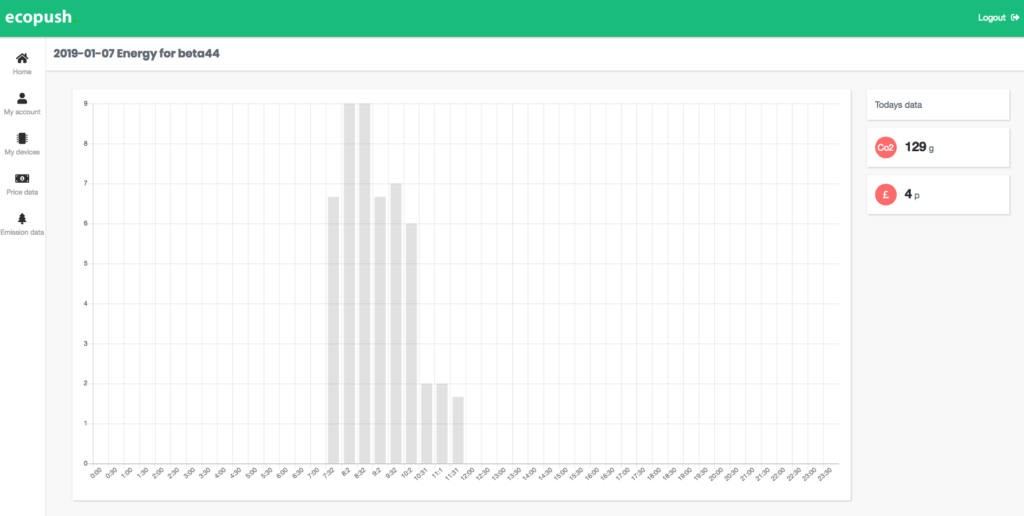In 2018, London-based start up ecopush won the Most Technically Interesting Device Award with their Amazon Alexa-based Smart Plug solution. At the end of February 2019, the start up officially launched their first product to market: an energy aware smart plug. The founders Frank Vitetta and Tom Berman are passionate about making better use of renewable energy (which accounts for 30% of UK supply!), but because it is volatile and difficult to predict, how and when you use it can make a big difference. That’s why their smart plug is optimised for cheapest price or lowest carbon footprint, thus saving you money as well as minimizing your impact on the environment.
In short: Ecopush creates a personalized plan. Each day it calculates the best times for you to use energy. The inbuilt energy margin shows you how much energy you use, when you use it, how much it costs you and even how much CO2 is released. The smart plug can be fully automated, allowing Ecopush to decide the cheapest and most eco-friendly time to switch your devices on. Just plug in a device such as a washing machine, laptop or mobile phone and let Ecopush decide the best time to switch it on. In this way you help reduce demand on the energy network and make sure that your carbon output is as low as possible. The plug works with all standard UK plugs and sockets.
Co-Founder Tom Berman answered a few questions for ethical.net.
Can you explain in lay terms what Ecopush is and does?

Throughout the day, there are good times to use energy and bad times. These times change constantly with the seasons and the weather (with more and more renewable energy sources out there). Ecopush listens to the conditions of the grid and calculates the best time for you to use energy.
What triggered the creation of Ecopush?
There are a couple of factors. I studied electronic engineering, and later sustainability. I became interested in renewable energy not only from the generation side, but also how we need to change our usages to make the best use of it. I was working at a green energy company [Octopus Energy] when I met Frank at a Hackathon for Agile tariff that prices energy a different prices throughout the day. Frank and I interfaced with a robotic push button to turn on a washing machine using Alexa when it was greenest or cheapest. After the competition, we realised that we were onto something groundbreaking and we decided to pursue our partnership to create a new product. That’s how the Ecopush plug was born.
Tom from Ecopush explains how the team integrated their robot push button with Octopus Energy’s Agile API and Amazon’s Alexa to remotely power a tumble dryer when energy is cheapest, or greenest. Other typical applications for Ecopush include: laptops, phones, tablets, dishwashers, tumble dryers, hot tub, electric scooter, e-bikes, vacuum cleaners.
Does the plug work with Octopus only?
For energy prices, Octopus Energy are the first company to offer tariff that changes so often, and reflects the generation on the grid. What is far more common are Eco7/10 tariffs that offer reduced costs at different times of the day. We fully support Eco7/Eco10 tariffs and have the times of every Eco7/10 tariff in our system.
For carbon emissions, you do not have to be on any tariff to get this information. We have data both at the national and regional level. You can decide how accurate you would like the data to be.
What makes Ecopush different from similar products on the market? BTW, are there any similar products on the market?
From my perspective, I feel that climate change is possibly the pressing issue of our time. We are trying to produce a device that not only helps you reduce your emissions automatically, but it also allows you to get an understanding of what is going on. We can monitor your energy use and show what that means in terms of carbon emissions and price [see attached screenshot]. Our plug has all the features found in the most advanced smart plugs on the market, including remote monitoring, switching & scheduling. Unlike other smart plugs on the market, Ecopush is fully automatic. Other systems involve you having to manually set timers and you don’t get access to data to track your consumption. Ecopush does all this for you, saving you money while making a meaningful impact on pollution control.
I would like our smart plug to have 2 effects. First is for someone to understand the issue, and put a number, both carbon and price to their energy use. The second part of the project is to provide a solution to automatically save money and emissions. So we hope it proves to be a motivating tool for most people. I see it sort of like a fitness tracker. For some people it provides a motivation just to do a little more each day, which can lead to large benefits long term.

How would you pitch this smart plug to a young(er) person? What about an old(er) one?
My answer relies on a generalisation, but to pitch to a younger audience is to pitch to an audience that for the most part understand climate change and its consequences. We concentrate on the environmental impacts and how you can do good for the world. We have worked very hard on making the technical aspects as smooth as possible, so for most people it will not be an issue. Working with stereotypes again, but an older audience might be more attracted to the money they can save on their energy bills. Work done by Octopus Energy show the potential costs savings to converting to time of use energy tariffs, and Ecopush only adds to the potential savings, as well as giving you an understanding of how much money your devices are using. I think the common knowledge that older people do not use technology is rapidly changing. With smartphones becoming ubiquitous, the way our app works will be familiar to anyone with one.
What is the most frequent question people ask you back after you just told them about the plug?
Perhaps this says more about the people I have been talking to, but the first and most frequent is “How does it work?” That tends to lead to discussions of the energy industry, and the way it is responding to the rapid growth of renewable energy.
What is the best lesson learned from launching a product on the market, in UK, in 2019?
The UK market is very competitive and for a small start up in the energy market is pretty difficult to create enough noise to get noticed by big publications and the media in general. We are trying various channel promotion at the moment so we don’t really know what is going to work.
Which are your favourite books, films, and podcasts related to energy, engineering, ethics, or anything else you’re passionate about?
Perhaps not directly energy related, but the book Small is Beautiful had a big impact on me when I was thinking about applications of my engineering knowledge. I think it covers a wide range of topics, and really sticks in my mind. As a general introduction to energy options, I recommend Without The Hot Air. As for podcasts, Beyond the Electron: Neural Grid and the Internet of Energy is something more narrowly talking about the electricity grid.
What’s next for Ecopush?
We have a few exciting events planned for 2019, we hope to get a couple of new partnerships with major energy players, and we have been talking to UK distributors to get our product featured on the high street.
How do you promote the product?
We have been getting some interesting feedback from Facebook groups interested in renewables. We have zero budget for marketing at the moment and all our funds have been spent to build the product and the tech behind it. We hope you can help us.
Are you bringing global major issues like climate change in the conversations about your product?
I feel that climate change is central to what we are trying to achieve with Ecopush. We want to help people use energy in a more effective way. We also give users the ability to get an understanding of the scale of the issue we are facing. If you can see how much carbon you device releases, you can have a better feel for your impact.
What sort of advice would you offer other entrepreneurs who are thinking to create a product or service related to the climate change challenge?
I personally think that not just climate change (although that is large enough) but a full awareness of the ecological impact of all business will provide a backdrop to all entrepreneurial activity. The entrepreneur has to provide a solution to a problem a group of people have. They now have to do that. They have to take into account the energy, materials and ethical ways they do that. Those thinking of starting a business should first find a problem they (and others) care about and solve it in the best possible way.
Would you call Ecopush an ethical product? If yes, why?
It is always difficult to say something is ethical. Ultimately we are making a physical product, and that takes resources. Hopefully this will be offset by the way this device helps people use energy in a more efficient manner and not use the grid when the emissions are peaking.
Where can we buy Ecopush?
You can buy directly from us, using card or PayPal, or you could get a free one if you sign up to the Octopus Agile tariff – which I encourage people to do anyway, as it is a green tariff and the savings are significant.
If you want any more details, drop Tom and Frank an email at info@ecopush.
~~~~~
Don’t forget that you can start conversations on topics close to your interests on the ethical forum.



Leave a Reply